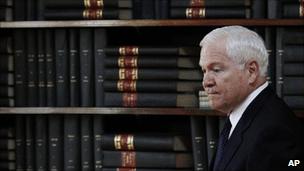Robert Gates on Nato's dim future
- Published
- comments

In his address, Mr Gates painted a rather pathetic picture of Nato failures in Afghanistan and Libya
It is one of the joys of leaving a job and an organisation: You can turn around and tell it like it is, giving harsh messages to friends and foes alike - it's especially effective if you are leaving on a high.
The outgoing US Defence Secretary Robert Gates is in that privileged position, and he's let rip about some of America's allies in Nato, external.
This is a critically important speech. It's no temper tantrum, and it is not, in any sense, a parting shot at his own administration.
Indeed it is the Obama doctrine, President Barack Obama's message to Europe, stripped of diplomatic niceties and soft words.
Mr Obama went to Europe, in part to deliver the message that the continent must take more responsibility for the rest of the world.
I am not quite sure it got through on his recent trip to the UK. He said, external that the transatlantic alliance, ensuring freedom and encouraging democracy, was essential for the world.
"And if we fail to meet that responsibility, who would take our place, and what kind of world would we pass on?" the president asked.
"Our action - our leadership - is essential to the cause of human dignity. And so we must act - and lead - with confidence in our ideals and an abiding faith in the character of our people, who sent us all here today."
Now, of course part of the Obama doctrine is that acting in the world doesn't have to be military action. But he hasn't entirely abandoned the belief common in the US that sometimes hope grows from the barrel of a gun. Mr Gates was talking about the nuts and bolts of how that happens.
Speaking to the Security and Defence Agenda conference, external on Friday, he said Nato could face a dim if not dismal future. He said he was exasperated that "just five of 28 allies - the US, UK, France, Greece, along with Albania - exceed the agreed 2% of GDP spending on defence".
And he set this in the context of an America that can't afford to do as much as in the past. The back seat driving in Libya is not an aberration but the future.
"The blunt reality is that there will be dwindling appetite and patience in the US Congress - and in the American body politic writ large - to expend increasingly precious funds on behalf of nations that are apparently unwilling to devote the necessary resources or make the necessary changes to be serious and capable partners in their own defence," he said. "Nations apparently willing and eager for American taxpayers to assume the growing security burden left by reductions in European defence budgets."
He went on the paint a rather pathetic picture of failures. First in Afghanistan:
"The Isaf, external mission has exposed significant shortcomings in Nato - in military capabilities, and in political will. Despite more than two million troops in uniform - not counting the US military - Nato has struggled, at times desperately, to sustain a deployment of 25,000 to 40,000 troops, not just in boots on the ground, but in crucial support assets such as helicopters, transport aircraft, maintenance, intelligence, surveillance and reconnaissance, and much more."
Mr Gates went on that Libya was even worse:
"We have the spectacle of an air operations centre designed to handle more than 300 sorties a day struggling to launch about 150. Furthermore, the mightiest military alliance in history is only 11 weeks into an operation against a poorly armed regime in a sparsely populated country - yet many allies are beginning to run short of munitions, requiring the US, once more, to make up the difference."
He says the worst can be avoided, but his only practical suggestion is for politicians to stand up against defence cuts. The stern message: the US will not police the world alone.
Nato is an organization that has lost a traditional enemy and failed to find a comfortable role.
Without the threat of the Soviet Union, Nato lost its purpose. But it also lost the sense that military action was a last, desperate gamble.
Afghanistan was a serious, if natural, extension of its role. After all, a member state had been attacked. Libya stretches further the mission statement, external.
But in many European countries, like the biggest and richest one, Germany, there is precious little appetite for such a post-colonial role in the first place (France and the UK are the exceptions).
Many want Nato's future to be - perhaps not dim - but toned down into a defensive alliance, rather than a bright force in the world, lighting up the night sky over the Middle East.
That ideological division could indeed be a crisis for the transatlantic alliance.